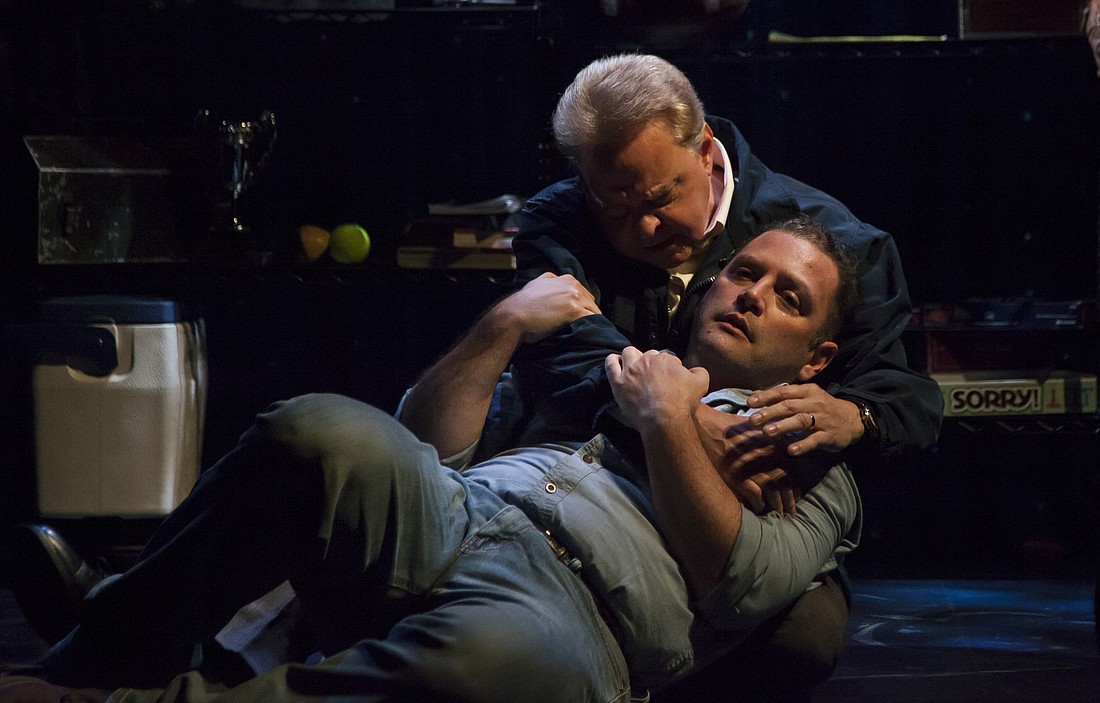- November 23, 2024
-
-
Loading

Loading

Florida Studio Theatre recently relaunched its Stage III series of edgy plays with “Stalking the Bogeyman.” It’s a fitting choice.
Markus Potter and David Holthouse’s reality-based play slaps you in the face with the first line. The lead character takes the stage and calmly announces:
“This time last year, I started plotting to kill a man. I had a gun, and a silencer and a plan.”
The protagonist shares the name of one of the playwrights—David Holthouse. That’s no coincidence. The play is an adaptation of Holthouse’s true story, originally published in an alternative weekly and later adapted as a segment on NPR’s “This American Life.”
His story is not a happy one. When he was 7, Holthouse was raped by the teenage son of his parents’ friends, aka, “The Bogeyman.” He kept the incident a secret for years. Threats and shame kept him silent.
Holthouse grew up to follow in Hunter S. Thompson’s footsteps as a gonzo journalist, infiltrating a motley score of subcultures, including gangs. As a result, he had access to untraceable weapons.
At the play’s start, he’d just bought an untraceable Beretta 9 mm pistol and an illegal homemade suppressor. Holthouse began intermittently stalking the Bogeyman, learning his habits and finding the best time to kill him and get away with it. Then, “by chance or divine intervention,” his parents cleaned out his room, found his childhood diary and read the account. They called their son and asked him if what they’d read was true. When Holthouse said it was, they phoned the rapist’s parents and told them the sickening story.
As Holthouse writes on his website, “I’d been confident I could get away with killing him, because only he and I knew the motive, and he would be dead. That was no longer the case.”
Now disarmed, Holthouse meets with the rapist. Instead of killing him, he confronts him with the evil he’s done and asks if he’s done it again. He says he was acting on a sick impulse, swearing it was a one-time thing. Holthouse gets the confession on tape with a hidden recorder. The rapist vanishes in the crowd, and Holthouse decides not to release his name.
Jason Cannon directs with a restrained economy that fits the short, sharp shock of the subject matter. David Perez-Ribada portrays Holthouse as a coiled spring of rage and self-control. Michael Stewart Allen captures the sociopathic shapeshifter’s ability to go from charismatic to blood-chilling in the blink of an eye. Kate Hampton and Andy Prosky perfectly capture Holthouse’s clueless, loving parents; Todd Licea and Katherine Michelle Tanner do the same for the rapist’s parents. Tanner is also great as Molly, Holthouse’s drug connection.
The playwrights show steely discipline. They write tight scenes and don’t wander or milk the scenes for emotion. This easily could’ve been a Lifetime movie or an after-school special. But the play’s free of histrionics. The worst scenes happen offstage and we only hear about them. (The brutal descriptions are hard enough to take.)
But outrageous acts aren’t the focus. The growing rage of the violated central character is: how the violation shaped and twisted his character. Holthouse does a slow burn throughout the play. Murder seems like the logical conclusion — though chance or divine intervention gives the play a different ending.
You can draw lessons from the play, although it doesn’t hand you any. Just a tale of hate and real-life monsters. Based on professional advice and the reports of other victims, Holthouse reached the same conclusion. Child rape isn’t an impulse. For some human monsters, it’s a relentless compulsion. (One professional estimated 30 to 50 other victims shared his fate at the hands of the Bogeyman.) Holthouse realized his rape had a well-practiced, assembly-line efficiency — over-and-done in 20 minutes.
He also realized that other kids would share his fate if he stayed silent, which is why he released the Bogeyman’s name on his website.